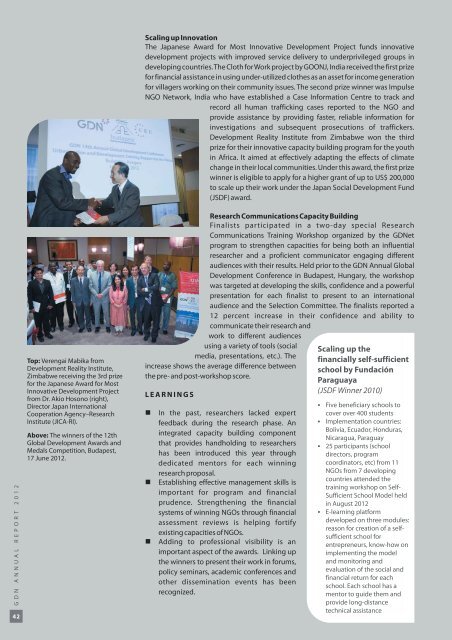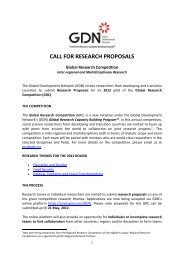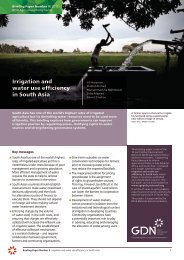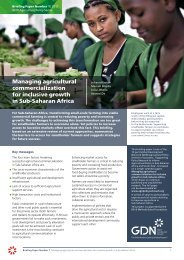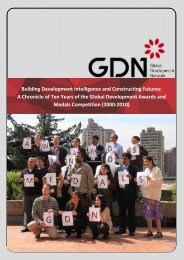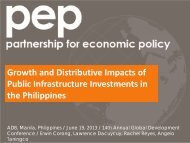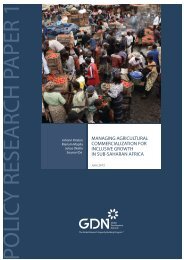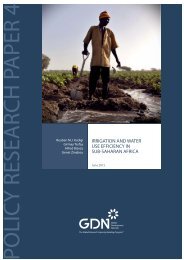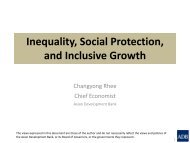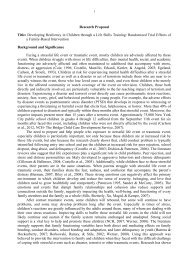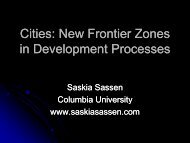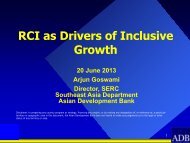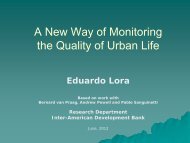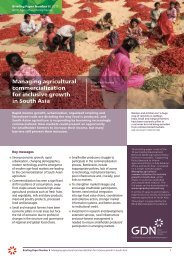ANNUAL REPORT - Global Development Network
ANNUAL REPORT - Global Development Network
ANNUAL REPORT - Global Development Network
Create successful ePaper yourself
Turn your PDF publications into a flip-book with our unique Google optimized e-Paper software.
Scaling up Innovation<br />
The Japanese Award for Most Innovative <strong>Development</strong> Project funds innovative<br />
development projects with improved service delivery to underprivileged groups in<br />
developing countries.The Cloth forWork project by GOONJ, India received the first prize<br />
for financial assistance in using under-utilized clothes as an asset for income generation<br />
for villagers working on their community issues. The second prize winner was Impulse<br />
NGO <strong>Network</strong>, India who have established a Case Information Centre to track and<br />
record all human trafficking cases reported to the NGO and<br />
provide assistance by providing faster, reliable information for<br />
investigations and subsequent prosecutions of traffickers.<br />
<strong>Development</strong> Reality Institute from Zimbabwe won the third<br />
prize for their innovative capacity building program for the youth<br />
in Africa. It aimed at effectively adapting the effects of climate<br />
change in their local communities. Under this award, the first prize<br />
winner is eligible to apply for a higher grant of up to US$ 200,000<br />
to scale up their work under the Japan Social <strong>Development</strong> Fund<br />
(JSDF) award.<br />
GDN <strong>ANNUAL</strong> <strong>REPORT</strong> 2012<br />
42<br />
Top: Verengai Mabika from<br />
<strong>Development</strong> Reality Institute,<br />
Zimbabwe receiving the 3rd prize<br />
for the Japanese Award for Most<br />
Innovative <strong>Development</strong> Project<br />
from Dr. Akio Hosono (right),<br />
Director Japan International<br />
Cooperation Agency–Research<br />
Institute (JICA-RI).<br />
Above: The winners of the 12th<br />
<strong>Global</strong> <strong>Development</strong> Awards and<br />
Medals Competition, Budapest,<br />
17 June 2012.<br />
LEARNINGS<br />
Research Communications Capacity Building<br />
Finalists participated in a two-day special Research<br />
Communications Training Workshop organized by the GDNet<br />
program to strengthen capacities for being both an influential<br />
researcher and a proficient communicator engaging different<br />
audiences with their results. Held prior to the GDN Annual <strong>Global</strong><br />
<strong>Development</strong> Conference in Budapest, Hungary, the workshop<br />
was targeted at developing the skills, confidence and a powerful<br />
presentation for each finalist to present to an international<br />
audience and the Selection Committee. The finalists reported a<br />
12 percent increase in their confidence and ability to<br />
communicate their research and<br />
work to different audiences<br />
using a variety of tools (social<br />
media, presentations, etc.). The<br />
increase shows the average difference between<br />
the pre- and post-workshop score.<br />
<br />
<br />
<br />
In the past, researchers lacked expert<br />
feedback during the research phase. An<br />
integrated capacity building component<br />
that provides handholding to researchers<br />
has been introduced this year through<br />
dedicated mentors for each winning<br />
research proposal.<br />
Establishing effective management skills is<br />
important for program and financial<br />
prudence. Strengthening the financial<br />
systems of winning NGOs through financial<br />
assessment reviews is helping fortify<br />
existing capacities of NGOs.<br />
Adding to professional visibility is an<br />
important aspect of the awards. Linking up<br />
the winners to present their work in forums,<br />
policy seminars, academic conferences and<br />
other dissemination events has been<br />
recognized.<br />
Scaling up the<br />
financially self-sufficient<br />
school by Fundación<br />
Paraguaya<br />
(JSDF Winner 2010)<br />
<br />
<br />
<br />
<br />
Five beneficiary schools to<br />
cover over 400 students<br />
Implementation countries:<br />
Bolivia, Ecuador, Honduras,<br />
Nicaragua, Paraguay<br />
25 participants (school<br />
directors, program<br />
coordinators, etc) from 11<br />
NGOs from 7 developing<br />
countries attended the<br />
training workshop on Self-<br />
Sufficient School Model held<br />
in August 2012<br />
E-learning platform<br />
developed on three modules:<br />
reason for creation of a selfsufficient<br />
school for<br />
entrepreneurs, know-how on<br />
implementing the model<br />
and monitoring and<br />
evaluation of the social and<br />
financial return for each<br />
school. Each school has a<br />
mentor to guide them and<br />
provide long-distance<br />
technical assistance


